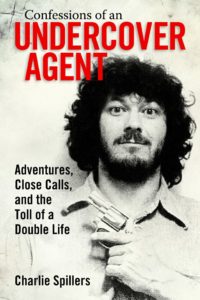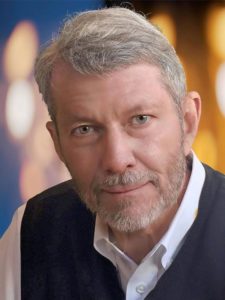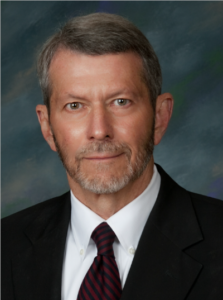Major Works
Memoirs
- Confessions of an Undercover Agent: Adventures, Close Calls, and The Toll of a Double Life (2016)
Novels
- Whirlwind: An Agent Frank Marsh Novel (2017)
- Flashpoint: A Frank Marsh Novel (to be released)
Biography of Author Charlie Spillers
Ex-Marine Charlie Spillers is a former agent, federal prosecutor, and Justice Attaché for Iraq. is the author of Confessions of an Undercover Agent: Adventures, Close Calls, and The Toll of a Double Life, published by University Press of Mississippi.
 The book describes his ten years of undercover crime fighting and narrow escapes. Playing different roles, he infiltrated drug trafficking groups, Dixie Mafia auto-theft rings, Mafia and Mexican drug smuggling operations, and fought police corruption.
The book describes his ten years of undercover crime fighting and narrow escapes. Playing different roles, he infiltrated drug trafficking groups, Dixie Mafia auto-theft rings, Mafia and Mexican drug smuggling operations, and fought police corruption.
He later became a federal prosecutor and volunteered and served three tours in Iraq. First as an attorney-advisor to the Iraqi court that tried Saddam Hussein and other regime leaders. He then served as the Justice Attaché for Iraq and led a joint project to disrupt al Qaeda financing. His work related to Iraq was recognized by the FBI Director, the British Ambassador and Britain’s Minister of State for the Armed Forces.
The Mississippi Institute of Arts and Letters nominated Confessions for the 2016 award for Best Nonfiction Book.
Mr. Spillers has written a novel, an international thriller entitled Whirlwind: An Agent Frank Marsh Novel, published in 2017, and is working on the sequel entitled Flashpoint. He moderated the panel “Crime and the Law” at the 2019 Mississippi Book Festival. Spillers lives in Oxford, Mississippi.
Author Q&A: Charlie Spillers, undercover agent
Oxford resident Charlie Spillers, who spent a decade of his early career as an undercover agent for the Mississippi Bureau of Narcotics, reveals years of surprisingly candid encounters in “Confessions of an Undercover Agent: Adventures, Close Calls, and the Toll of a Double Life,” published by University Press of Mississippi.
Born in Baton Rouge, Spillers’ family soon moved to Mississippi, where he spent much of his childhood living in Natchez, Roxie, Cranfield, Washington, Brookhaven and Magee. His undercover career with the MBN included years he called Jackson, Long Beach, Gulfport, Tupelo and Oxford his home.
Spillers graduated from Magee High School in 1963, and spent three years U.S Marine Corps before embarking on a 42-year career in law enforcement. Working full time and going to college off and on, he graduated from the University of Mississippi with a business degree in 1981 and from Ole Miss Law School in 1986.
Today he lives in Oxford, where he was an adjunct professor at Ole Miss, and now serves as instructor in continuing legal education courses.
In your book, you talk about getting used to being an “outsider” as a child, and how that helped in your future career. Please tell me about that.
Most people grow up in the same town and go to school with friends they have known all their lives. Imagine moving from one town or state to another during the school year to a town where you don’t know a soul, and walking into a classroom full of strangers. I went through that at least eight or nine times in Louisiana and Mississippi. And just as I was getting comfortable in a new town we moved again. Perhaps I began learning skills that helped me later in undercover work when trying to infiltrate suspicious groups of criminals who had known each other all their lives — learning how to “read” people and how to make friends.
Moving frequently was a broadening experience because I met more people and had a variety of experiences. Perhaps that helped me become more tolerant and accepting of others.
After a three-year enlistment with the U.S. Marines that included close calls in the Caribbean and Vietnam, you got married, settled down in North Carolina, and spent a “quiet year” as a phone company employee, but soon found yourself “longing for excitement.” A change of jobs as a police officer then began a 42-year career in law enforcement. Why the tug to a more adventurous lifestyle?
Tell me about the roles you played and lived out as an undercover agent.
I used multiple identities for 10 years to make cases on drug traffickers and other career criminals. These identities included a wealthy Memphis businessman involved with Mafia and Mexican drug-smuggling operations in Houston, Texas; a cabdriver on the Gulf Coast working with heroin dealers; a Jackson drug dealer meeting suppliers in New Orleans; a safecracker’s accomplice; a PCP dealer in Baton Rouge; and a criminal sending stolen cars from Mississippi to Alabama, Louisiana and Florida.
I also briefly worked undercover jobs to infiltrate criminal activity, including working in a hospital supply room, with a house siding crew in north Louisiana, and in a large industrial laundry facility.
How did your work affect your family’s lifestyle and everyday routines?
We couldn’t plan anything because my work dominated our lives. I didn’t have regular work hours or days, and when I was home I might have to suddenly leave at any moment to meet criminals. Even at home I was busy with work all the time — writing reports at the kitchen table and on the phone for hours with criminals and informants. When I left for an undercover meeting I might not come home until the next day or days later. On extended undercover in another area I might get to come home one night a week.
We kept a low profile with neighbors about what I did for a living, and sometimes my wife and I used a cover story. For example, when I worked undercover on the Gulf Coast to infiltrate heroin trafficking rings we told neighbors that I was doing research on a graduate degree and we were living off a stipend and an inheritance. Our neighbors were trustworthy but the danger comes from someone telling a trusted friend who tells another trusted friend and so on until word reaches the streets and an undercover agent is compromised and in great danger.
You state in the book that because your work could be filled with “surges of relief and elation,” you became addicted to the excitement of working undercover. Explain.
The surges of adrenaline became additive. After years of undercover work, I became confident and felt as if I could handle anything, no matter how dangerous. I became overly confident and even reckless, taking chances that I would never allow another undercover agent to take. But my fellow MBN agents were doing the same thing — working in frequent peril and taking too many chances. I wrote about the experiences of other agents who were in even more danger than I was, some of whom died or were wounded. I hope readers will appreciate the dedication and courage of the young men and women with whom I served.
The subtitle of your book hints at the “toll of a double life” as an undercover agent. Please tell me about how that played out in your personal and professional life.
In the book I not only wrote about close calls but also about the aftermath — the tension and inability to easily decompress. At the end I summarized the effects that years of tension-filled, high-stress undercover took on my health, my instincts and our family life after 10 years of undercover. I discuss that in the book simply to explain the effects and the human cost of extended undercover work.
Because you were working and attending school part-time, it took you 12 years to earn your undergraduate degree, and four more to finish your law degree. What was that like? Many people probably would have given up.
After the Marines, I began attending High Point College on the GI Bill and continued when I could at LSU and then Ole Miss, including at the University of Mississippi extensions in Jackson and Tupelo and then on the campus itself. On top of undercover stresses, trying to study and attend classes while working full-time was an ordeal. I missed a lot of classes, and rushing from a hair-raising close call to sit in an economics class for an hour was an unreal experience, especially when my heart was still racing and my mind was still spinning with what had just happened. I always warn others not to do it like I did. I still don’t know how I did it.
Why did you eventually give up your undercover work? Tell me about your career since then.
Most people who work primarily undercover do it for a year or two. I did it for 10 years and then was promoted to MBN regional commander for north Mississippi, so it was time to stop.
While serving as an MBN regional commander I finished law school and left the bureau after about 13 years. I joined the Holcomb Dunbar law firm in Oxford and handled civil lawsuits for two years. I then joined the U.S. Attorney’s Office for the Northern District of Mississippi and served as a federal prosecutor for 23 years, leading investigations and prosecutions of major drug trafficking organizations. I occasionally prosecuted other types of cases including corruption, white collar crime, bank robberies, murder-for-hire and major health care fraud.
As a federal prosecutor I volunteered and served three tours in Iraq, two years total, first as an attorney adviser to the Iraqi High Tribunal, the court that tried Saddam Hussein, “Chemical Ali” (Ali Hassan Abd al-Majid al-Tikriti) and others, then as the head of the unit advising the court. In my third tour I served as the U.S. Department of Justice attaché for Iraq.
After my last undercover case I missed it for years, longing for the challenge and thrill of undercover. But while it is exhilarating, undercover is physically and mentally draining, and agents who do it must be able think and perform at a high level at all times, even when exhausted. Success and survival depend on it.
Why did you decide to write this book?
Because I worked undercover so long and on a wide variety of criminals I had unusual and unique experiences, even for an undercover agent. I realized the public might find those experiences interesting and exciting. And it is being shared widely. Based on best-selling rankings, Amazon touts the book as the “number one new release in law enforcement biographies nationwide.”
When I compiled anxious moments from my different experiences in the book, I was surprised there were so many. Law enforcement agencies and MBN worked differently when I was an agent than they do now. Back then they stressed undercover work, but now agents do very little undercover. Instead, they make cases through conspiracy investigations and court-authorized wiretaps on drug trafficking organizations.
My undercover experiences continue to help me because I weave some experiences into the novels I’m writing — international thrillers that are not yet published.
Looking back, would you do it all again? Would you change anything?
My undercover crime-fighting career was characterized by risk and ingenuity. Working undercover was exciting and exhilarating, and I made cases on criminals that may never have been caught otherwise. And, I fought corruption. I particularly enjoyed undercover because I had to use all my capabilities in order to survive and succeed in a sometimes dangerous world. I excelled and thrived in it — and was lucky.
After writing the book and reflecting, I realized that my wife and son were victims of those many years of undercover because they were deprived of a normal life and a normal family life. Our family paid a price, suffered too much and somehow survived. I accomplished a lot because of my undercover work but the price was too high. Because of that I wouldn’t do it over again.
My wife Evelyn agrees. As she read the last paragraph, tears rolled down her cheeks and she told me that my undercover work was the worst 10 years of her life. So the answer is no, I definitely would not do it all over again.
Related Websites
- Amazon review of memoir Confessions of an Undercover Agent
- News video of Spillers discussing Confessions.
- Read the above interview on April 23, 2016 by Jana Hoops in the Clarion-Ledger with Charlie Spillers.
- Mississippi University Press info about Spillers’ memoir
- Square Books info about Confessions
- BlogTalkRadio talks to Charlie Spillers about his work (audio)
- Video of interview with Charlie Spillers– 4-minute TV interview July 31, 2017, at KLAB TV in Alexandria, LA.


